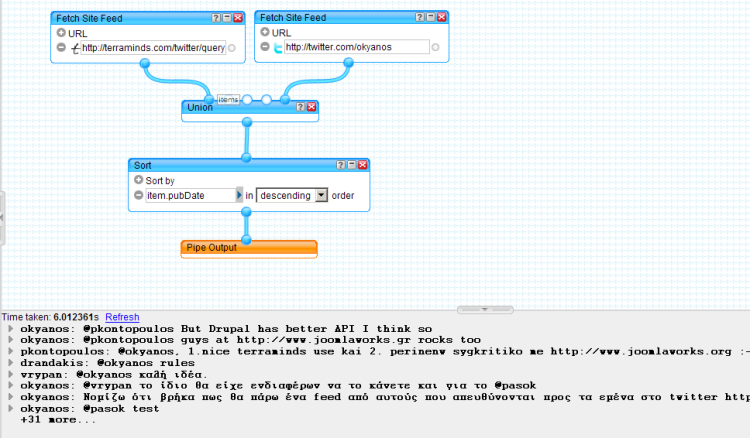Developers often look for value in unexpected places, and one of those places for the last few years has been Yahoo. Its Pipes app launched in 2007 and quickly proved to be one of the most innovative data stream management apps around.
Now, nearly a decade later, Yahoo’s rocky history with users and their internal reorganization has led to it announcing that it would be terminating several services, including Maps and Pipes.
As one of the people who still used Pipes on a daily basis, this is awful news. I doubt my writing about it will change any minds, but I believe the closure of Pipes is a bad idea, and here’s why.
1. Many Developers Rely on It
Yes, it’s an older property. Yes, it has been somewhat replaced in recent years by services like IFTTT. We all know, though, how hard it is to get developers to update the services they use. Pipes is like an old friend, who maybe doesn’t have the prettiest interface and requires a bit of knowledge to use properly, but damnit, we have that knowledge. We worked for that knowledge, back before IFTTT came out with their fancy Web 2.0 interface.
Pipes grew to prominence primarily because it crossed a boundary. It began with the Unix concept of data pipelines and it kept enough of that concept and implementation to appeal to hardcore nerds. On the other hand, it brought a relatively simple, if not quite stylish interface to the whole thing, and made visual, conceptual data stream management accessible to anyone. The only reason it lost users over time is the same reason anything does; it stagnated, it didn’t change, it didn’t grow.
2. It Was One of Yahoo’s Most Versatile Offerings
If you take an inventory of services that Google and Yahoo offer, you’ll see a heavy weight on Google’s side. Yahoo has Maps; Google has Maps and Earth. Yahoo has mail, Google has Gmail. Yahoo has search, Google of course has search. Yahoo’s news-based homepage syndicates content from around the web, Google News links to that content directly in a more curated feed.
Pipes was one of the very, very few things that Google didn’t offer a direct competitor to. It’s not as though Google couldn’t implement something of the type. I’m sure they’ve thought of something similar, but at this point they could just buy IFTTT and be done with it.
3. It Was Cool
Maybe my inner geek is showing here, but I thought Yahoo’s Pipes service was really cool. I primarily used it to take RSS feeds, condense them into more digestible, smaller chunks, and create centralized feeds. It saved me a lot of time and energy over the years, and now it’s gone. It’s like a piece of my Internet history disappearing, soon to be forgotten in the crush of new services and developments.
4. They’re Giving Up the Fight With Google
Form the Yahoo board of directors comes an order; condense, prune, and optimize. Marissa Meyer is shaping the formerly sprawling, nebulous company under three pillars; search, communications, and digital content.
Search? Where Bing struggles to maintain a market share and Yahoo is a distant glimmer in the user’s eye, they want to make it a core pillar of their business? I’m not sure that’s wise. Worse, though, between communications and digital content, how does Pipes not fit in? It seems like a perfect service to spruce up, to optimize, and to make a primary offering.
Of course, I’m not Yahoo’s CEO. I don’t have the data and perspective she has. I suppose it’s entirely possible she knows something I don’t.
5. Tim O’Reilly Called it a Milestone
Okay, so the opinion of one influential man eight years ago may not hold a lot of water today, but it was still a Big Thing back then. O’Reilly praised Pipes for being an innovative and potent form of content filtering, aggregation and mashing. He envisioned Pipes as the beginning of a new paradigm, of websites as data sources and of users as the end points of a custom curated flow of information.
In many ways, through social media and through curated streams, this vision has come to pass. It’s sad to see one of the most influential progenitor services calling it quits.
6. Other Apps Reliant on Pipes Will Die
Yahoo Pipes today don’t seem to be all that potent, but that’s just looking at the service itself. Think about how many other services and apps today may have been built on that framework. I’ve personally seen even Android apps using it as a source for data. Those apps, anything and anyone reliant on data streams from Yahoo Pipes, will need to adapt or die in the coming months. Yahoo made their announcement; on August 30, creation of new pipes will be disabled. On September 30, the service will close, and so will anything that still relies on their data feeds. This gives anyone who relies on a Pipes or Pipes-derived service only four months to find something else.
IFTTT will no doubt suffer a boost in clientele in the coming months, with it being the primary Pipes alternative. Other services offering workflow processes and feed management will see bumps as well. Meanwhile, in the hearts of many, a Pipes-shaped hole will remain unfilled. Rest in peace, Pipes; you lived a full life. I only wish it could be longer.
VentureBeat's mission is to be a digital town square for technical decision-makers to gain knowledge about transformative enterprise technology and transact. Learn More

